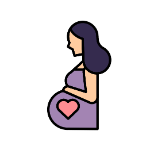
Top 10 Tips That Will Help You To Conceive
You're all set to become pregnant. Now, when you're ready to start a family, the final thing you want to do is wait. If you have an underlying disease, you may have a lot of questions regarding how to get pregnant. Taking care of your body is an excellent start when it comes to improving your fertility. But what more can you do to increase your chances of getting pregnant?
(Image credits to Canva)
The most essential piece of advice for a woman trying to conceive is to learn about her body, particularly her menstrual cycle. We've compiled a list of the top 10 tips that will help you to conceive and increase your chances of becoming pregnant. Always get medical guidance when dealing with this sort of material, as this advice is general and you may require specialized treatment. This article and accompanying video on how to get pregnant should still be helpful.
#1 Get a preconception checkup
Make an appointment with your OB-GYN 60 to 90 days before you want to start trying. They'll talk about your reproductive plans with you, test you for illnesses like anemia that may require treatment, and suggest safer options to any prescription or over-the-counter medications you're taking.
(Image credits to Canva)
Clearing any difficulties upfront will help you avoid delays later on when your fertility is dropping owing to a decrease in the quality and number of your eggs.
#2 Get to know your menstrual cycle
A woman who wishes to have a baby must keep track of whether the beginning days of her cycles occur at the same time each month, which is termed regular. Her periods, on the other hand, maybe erratic, with cycle durations varying from month to month.
(Image credits to Canva)
By keeping track of this information on a calendar, a woman can better forecast when she will be ovulating, or when her ovaries will release an egg once a month.
#3 Monitor your ovulation
Women with regular periods ovulate roughly two weeks before their periods arrive. Ovulation is more difficult to predict in women who have irregular cycles, but it normally happens 12 to 16 days before her next period.
People who menstruate have a wide range of cycle durations, and the time and duration of ovulation vary throughout their life. Because of this unpredictability, it is essential to track ovulation to determine when a person is most likely to conceive.
(Image credits to Canva)
#4 Take prenatal vitamin
Even before becoming pregnant, women who are trying to conceive begin taking a prenatal vitamin. In this manner, a woman can choose one that suits her better and stick with it throughout her pregnancy. Another option is to take a daily multivitamin containing at least 400 micrograms (mcg) of folic acid, a B vitamin essential for avoiding birth abnormalities in the brain and spine of a baby.
(Image credits to Canva)
#5 Reduce your stress level
Exercising is a good habit to develop, especially if it helps you maintain your target weight. However, just like anything else, there is such a thing as too much of a good thing. Exercising too much can prevent you from ovulating.
(Image credits Canva)
Don't get too agitated over starting a family. If someone says, "Just relax and it will happen," you might roll your eyes, but stress might really prevent ovulation. As a result, the more at ease you are, the better!
Whatever helps you de-stress as long as it's healthy is OK. Acupuncture has been shown to help relieve stress and boost your chances of becoming pregnant. And, while consuming too much alcohol while trying to conceive isn't a good idea, a glass of wine won't hurt.
#6 Live a healthy life
Although there is no special pregnancy diet, research has shown that eating a range of healthful foods can help a woman's body prepare for pregnancy by providing her with enough stocks of vital nutrients such as calcium, protein, and iron. This entails consuming a wide range of fruits and vegetables, as well as lean protein, whole grains, milk, and healthy fats. A woman can take folic acid through meals including dark green leafy vegetables, broccoli, preserved breads and cereals, beans, citrus fruits, and orange juice in addition to taking a folic acid supplement.
(Image credits to Canva)
To improve your chances of becoming pregnant, quit smoking. Apart from the numerous severe health consequences of smoking, this bad habit also reduces fertility. It has an impact on estrogen levels as well as ovulation.
#7 Stop drinking
Cutting back on drinking is advised, and booze fests must be avoided. Nobody knows exactly what occurs when you drink heavily for a long time before conceiving, although structural alterations in the eggs are likely to impact the quality. It's difficult to predict how long it will take them to recover, if at all, so stop as soon as you are ready to try to conceive.
(Image credits to Canva)
#8 Know when to look for help
If a woman is 35 or older and hasn't become pregnant after six months of having intercourse regularly without taking birth control, she and her partner should consider getting an infertility test.
(Image credits to Canva)
A woman under the age of 35 and her partner see a fertility doctor if she hasn't become pregnant after a year of frequent unprotected sexual intercourse.
#9 After intercourse, don’t leave the bed right away
You've probably heard this one: after having sex, lie in bed with your feet in the air to improve your chances of becoming pregnant. What's the verdict? This is (completely) incorrect.
(Image credits to Canva)
After intercourse, it's a good idea to rest in bed for 10 to 15 minutes, but you don't need your feet in the air. When you lift your legs into the air, your pelvis remains still. Also, don't use the restroom during this period. The sperm that will go into the cervix will be in the cervix if you don't move for 10 to 15 minutes.
#10 Don't overdo it
Having intercourse every day, even during ovulation, does not guarantee that you will become pregnant. In general, ovulation occurs every other night, which increases your chances of becoming pregnant. Sperm can survive in your body for up to 5 days. The greatest advice is to have sex on a regular basis, both while you're ovulating and when you aren't.
We hope you found our pick on the top 10 tips that will help you to conceive informatively. If you are trying to conceive, from HappyPreggie we wish you all the very best. Follow the above-mentioned tips to speed up your journey towards motherhood.
If you want to read more we will suggest you read- Top Pregnancy Fears That Every New Moms Face and List Of 20 Types Of Foods That Will Help To Develop Baby's Brain In The Womb.
















